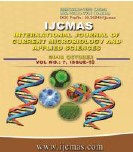


 National Academy of Agricultural Sciences (NAAS)
National Academy of Agricultural Sciences (NAAS)

|
PRINT ISSN : 2319-7692
Online ISSN : 2319-7706 Issues : 12 per year Publisher : Excellent Publishers Email : editorijcmas@gmail.com / submit@ijcmas.com Editor-in-chief: Dr.M.Prakash Index Copernicus ICV 2018: 95.39 NAAS RATING 2020: 5.38 |
1Division of Basic Sci. & Humanities, FOA, Wadura, SKUAST-Kashmir, India
2Division of Agronomy, FOA, Wadura, SKUAST-Kashmir, India
3Division of Agriculture statistics, FOA, Wadura, SKAUST-Kashmir, India
Bio-fertilizer is a substance used to increase the fertility of the soil. It contains micro-organisms which helps the soil to gain its nutrient back and make the soil available for cultivation. Bio-fertilizer doesn’t make any kind of pollution, so it is not a threat to use them in the place of the chemical fertilizers which causes a lot of pollution to the environment. Current soil management strategies are mainly dependent on inorganic chemical-based fertilizers, which caused a serious threat to human health and environment. The exploitation of beneficial microbes as a biofertilizer has become of paramount importance in forestry and agriculture sector for their potential role in healthy growing stock, food safety and sustainable crop production. The application of microbial inoculants (biofertilizers) is a promising technology for future forest nursery raisings and sustainable farming systems in view of rapidly decreasing phosphorus stocks and the need to more efficiently use available nitrogen (N). Various microbial taxa are currently used as biofertilizers, based on their capacity to access nutrients from fertilizers and soil stocks, to fix atmospheric nitrogen, to improve water uptake or to act as biocontrol agents. Plant nutrients are essential for the production of crops and healthy food for the world’s ever increasing population. Bio-fertilizer can be an important component of integrated nutrients management in forest ecosystems. Microorganisms that are commonly used as bio-fertilizer components include; nitrogen fixers (N-fixer), potassium and phosphorus solubilizers, growth promoting rhizobacteria (PGPRs), endo and ectomycorrhizal fungi, cyanobacteria and other useful microscopic organisms. The use of bio-fertilizers leads to improved nutrient and water uptake, plant growth and plant tolerance to abiotic and biotic factors. These potential biological fertilizers would play a key role in production of quality seedlings and sustainability of soil and also in protecting the environment as eco-friendly and cost effective inputs for the farmers.
 |
 |
 |
 |
 |